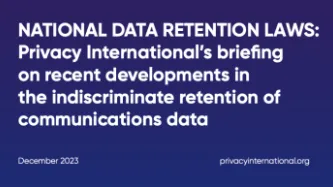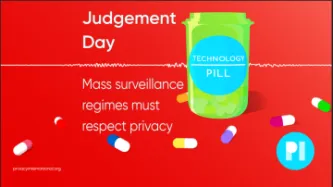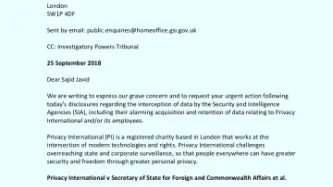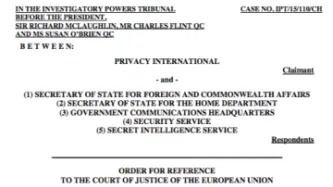Advanced Search
Content Type: Advocacy
We responded to the Home Office consultation on codes of practices under the Investigatory Powers (Amendment) Act 2024 (IPAA). Our response focused on (1) the draft codes relating to bulk personal datasets with low or no reasonable expection of privacy, (2) third-party bulk personal datasets and (3) the notices regime. You can download our full response with its 23 recommendations for reform at the bottom of this page.'Low Privacy' Bulk Personal DatasetsThe IPAA introduces a new concept of…
Content Type: Report
Over the past years, data retention regulation imposing generalised and indiscriminate data retention obligations to telecommunication companies and Internet service provides has been introduced in various jurisdictions across the world. As the data retention practices across the world have evolved this new report is an attempt to shed some light on the current state of affairs in data retention regulation across ten key jurisdictions. Privacy International has consulted with human…
Content Type: Long Read
Additionally, in January 2020 Privacy International and UK-based NGO Liberty filed a new claim against MI5 and the Secretary of State for the Home Department in the Investigatory Powers Tribunal (the “Ungoverned Spaces Case”, this time, the case sought to hold MI5 and the SSHD accountable for systemic, long-term failures in the way they handle and retain millions of people’s personal data. As part of this claim, PI requested that the IPT re-opens parts of the original BPD/BCD. This aspect of…
Content Type: News & Analysis
What happened
On 22 July 2021, the Investigatory Powers Tribunal (IPT) issued a declaration on our challenge to the UK bulk communications regime finding that section 94 of the Telecommunications Act 1984 (since repealed by the Investigatory Powers Act 2016) was incompatible with EU law human rights standards. The result of the judgment is that a decade’s worth of secret data capture has been held to be unlawful. The unlawfulness would have remained a secret but for PI’s work.
You…
Content Type: Long Read
Content Type: Video
Find out more on our website: https://privacyinternational.org/long-read/4206/qa-eus-top-court-rules-uk-french-and-belgian-mass-surveillance-regimes-must-respect
And make sure we can keep taking these fights to court: support.privacyinternational.org
You can listen and subscribe to the podcast where ever you normally find your podcasts:
Spotify
Apple podcasts
Google podcasts
Castbox
Overcast
Pocket Casts
Peertube
Youtube
Stitcher
And more...
Content Type: Long Read
Q&A: EU's top court rules that UK, French and Belgian mass surveillance regimes must respect privacy
Content Type: Press release
By treating everyone as a suspect, the bulk data collection or retention regimes engage European fundamental rights to privacy, data protection, freedom of expression, as guaranteed respectively by Articles 7, 8, and 11 of the EU Charter of Fundamental Rights.
Caroline Wilson Palow, Legal Director of Privacy International, said:
"Today’s judgment reinforces the rule of law in the EU. In these turbulent times, it serves as a reminder that no government should be above the law. Democratic…
Content Type: News & Analysis
In September 2019, PI published the report Your Mental Health for Sale. Our investigation looked into popular mental health websites and their data sharing practices.
Our findings suggest that, at the time of the research, most websites we looked at were using third party tracking for advertising purposes, sometimes relying on programmatic advertising technologies such as Real Time Bidding (RTB), sharing personal data with potentially thousands of actors. Some websites were also found sharing…
Content Type: Report
The changes discussed in this article are based on a second analysis performed in late November, 3 months after the original study Your Mental Health is for Sale and following the exact same methodology. All data collected can be found at the bottom of this page.
Change is possible
Back in September 2019 we published the report Your Mental Health is for Sale exposing how a majority of the top websites related to mental health in France, Germany and the UK share data for advertising purposes.…
Content Type: News & Analysis
Today Advocate General (AG) Campos Sánchez-Bordona of the Court of Justice of the European Union (CJEU), issued his opinions (C-623/17, C-511/18 and C-512/18 and C-520/18) on how he believes the Court should rule on vital questions relating to the conditions under which security and intelligence agencies in the UK, France and Belgium could have access to communications data retained by telecommunications providers.
The AG addressed two major questions:
(1) When states seek to impose…
Content Type: Press release
Today the Advocate General (AG) of the Court of Justice of the European Union (CJEU), Campos Sánchez-Bordona, issued his opinion on how he believes the Court should rule on vital questions relating to the conditions under which security and intelligence agencies in the UK, France and Belgium could have access to communications data retained by telecommunications providers.
The AG advises the following:
The UK’s collection of bulk communications data violates EU law.
The French and Belgium…
Content Type: Long Read
A new study by Privacy International reveals how popular websites about depression in France, Germany and the UK share user data with advertisers, data brokers and large tech companies, while some depression test websites leak answers and test results with third parties. The findings raise serious concerns about compliance with European data protection and privacy laws.
This article is part of a research led by Privacy International on mental health websites and tracking. Read our…
Content Type: Report
The full report of Privacy International's study on how popular websites about depression in France, Germany and the UK share user data with advertisers, data brokers and large tech companies, while some depression test websites leak answers and test results with third parties. The findings raise serious concerns about compliance with European data protection and privacy laws.
Content Type: News & Analysis
This article is part of a research led by Privacy International on mental health websites and tracking. Read our full report.
According to the World Health Organisation (WHO), 25 percent of the European population suffers from depression or anxiety each year, yet about 50% of major depressions remain untreated. This means that everyday thousands of people are looking for information about depression online. They take tests to find out how serious their symptoms are, they try to access…
Content Type: Long Read
The UK's domestic-facing intelligence agency, MI5, today admitted that it captured and read Privacy International's private data as part of its Bulk Communications Data (BCD) and Bulk Personal Datasets (BPD) programmes, which hoover up massive amounts of the public's data. In further startling legal disclosures, all three of the UK's primary intelligence agencies - GCHQ, MI5, and MI6 - also admitted that they unlawfully gathered data about Privacy International or its staff. You can read the…
Content Type: Press release
We found this image here
The Investigatory Powers Tribunal (IPT) today held that, for a sustained period, successive Foreign Secretaries wrongly gave GCHQ unfettered discretion to collect vast quantities of personal customer information from telecommunications companies.
The judgment exposes:
· the error-ridden and inconsistent evidence provided by GCHQ throughout the case;
· the willingness of telecommunications companies to secretly hand over customer data on the basis of mere verbal…
Content Type: Press release
Hearing: Cross examination of senior GCHQ official about Intelligence Agencies’ use of massive databases of information about everyone in the UK
When: Monday 26 February 2018, 3.15pm
Where: Royal Courts of Justice, Court 28, Strand, London WC2A 2LL
Summary
This is the first time GCHQ have given open evidence in the Investigatory Powers Tribunal (The Tribunal). It is also the first time they will be cross examined by Privacy International on serious misleading errors they provided in…
Content Type: Press release
The Case
Privacy International v Secretary of State for Foreign and Commonwealth Affairs et al. (Bulk Personal Datasets & Bulk Communications Data challenge)
Date: 5-9 June 2017
Time: from 10:00 onwards
Location: Royal Courts of Justice, The Strand, London WC2A 2LL United Kingdom
Hearing overview
Next week’s hearing follows the Investigatory Powers Tribunal’s earlier judgment in October 2016, which ruled that three issues are to be determined:
…
Content Type: Long Read
On 8 September 2017, the Investigatory Powers Tribunal decided to refer questions to the Court of Justice of the European Union (‘CJEU’) concerning the collection of bulk communications data (‘BCD’) by the Security Intelligence Agencies from mobile network operators.
The BCD regime was initially secret. In an earlier judgment, the Investigatory Powers Tribunal ruled that the regime was not compliant with the European Convention on Human Rights prior to its public avowal, but (subject to…
Content Type: Legal Case Files
A skeleton argument is a document produced for the court. It is more usually produced as a means of presenting the skeleton or ‘bare bones’ of a case before a trial.
The skeleton arguments cross-reference documents in the bundles. There is a consolidated index here: [Consolidated Index]
References in the form [Bundle/Tab/Page] are to the following bundles:
Bundles used for the July 2016 hearing, namely ‘Core’ and bundles numbered consecutively 1 to 5
Supplemental bundle prepared for the…





















